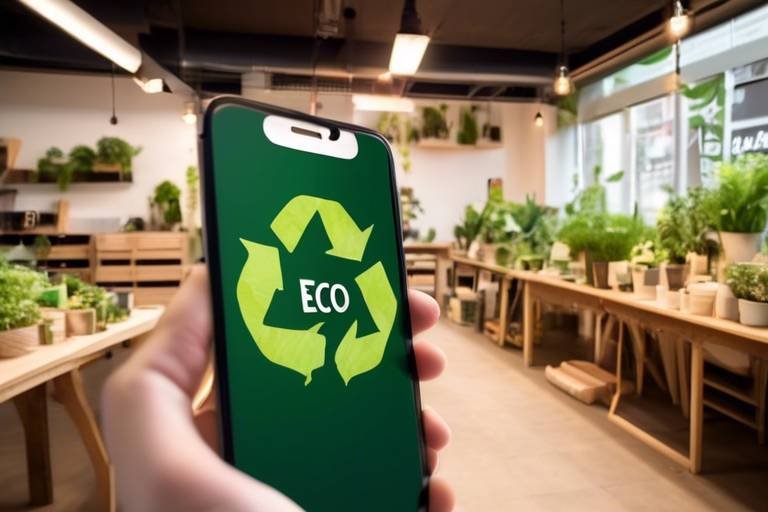How Small Businesses Can Benefit from Being More Eco-Friendly
In today’s rapidly changing world, the importance of sustainability cannot be overstated. Small businesses, in particular, have a unique opportunity to make a significant impact by adopting eco-friendly practices. Not only does going green help the environment, but it also opens the door to a multitude of benefits that can elevate a business's success. Imagine a world where your business not only thrives but also contributes positively to the planet—sounds appealing, right? Let's dive into the various advantages that eco-friendly practices can bring to small businesses.
Implementing eco-friendly practices can lead to significant cost savings for small businesses. From reducing energy consumption to managing waste more efficiently, these changes can dramatically improve a business's bottom line. For instance, by switching to energy-efficient lighting or optimizing heating and cooling systems, businesses can see a noticeable drop in their energy bills. Moreover, adopting waste reduction strategies can minimize disposal costs. It’s like finding hidden treasure in your budget! The more you save, the more you can invest in other essential areas of your business.
In a marketplace crowded with competitors, standing out is crucial. Adopting sustainable practices enhances a small business's brand image, attracting environmentally conscious consumers. Think of it this way: when you wear a badge of sustainability, you not only show your commitment to the planet but also differentiate yourself from others. This appeal to eco-conscious customers can foster loyalty and drive sales. But how do you attract these customers? Let’s explore some strategies.
Promoting your eco-friendly initiatives can resonate with a growing demographic of consumers who prioritize sustainability. This isn’t just about selling products; it’s about creating a community around shared values. When customers know that your business cares about the environment, they are more likely to choose you over a competitor who doesn’t. It’s like being part of a club where everyone shares the same passion for making the world a better place. To further enhance this connection, consider highlighting your sustainable practices in your marketing campaigns.
When you highlight green products and services, you not only increase visibility but also reinforce your commitment to sustainability. A well-crafted marketing message can be the difference between a customer choosing your product or passing it by. For example, if you sell eco-friendly cleaning supplies, sharing the story behind your products can create a powerful emotional connection. Customers love to know that their purchases are contributing to a healthier planet.
Engaging in eco-friendly practices can strengthen your ties to the community. Local consumers appreciate businesses that contribute positively to the environment and support local sustainability efforts. This connection can lead to word-of-mouth referrals and a loyal customer base. It’s like planting a seed that grows into a strong tree, providing shade and shelter for everyone around.
Creating a sustainable workplace can also boost employee morale and satisfaction. When employees see their company taking steps toward sustainability, it fosters a sense of pride and belonging. Happy employees are more productive and tend to stick around longer, which saves you money on turnover costs. Imagine walking into an office where everyone is excited about their work because they know they are making a difference—a win-win for everyone!
Small businesses that implement eco-friendly practices may qualify for various grants and funding opportunities aimed at promoting sustainability. This financial support can help cover the costs of green initiatives, making it easier for businesses to transition to more sustainable operations. It’s like having a financial safety net that allows you to explore new options without the fear of breaking the bank.
Many governments offer financial incentives for businesses adopting sustainable practices. These incentives can help offset initial costs and encourage further investment in eco-friendly technologies. For example, tax credits for energy-efficient upgrades can significantly reduce your expenses. It’s an opportunity that can’t be ignored!
Eco-friendly businesses may find new partnership opportunities with like-minded organizations and suppliers. Collaborating with others who share your values can enhance your sustainability efforts and expand your market reach. Think of it as forming a powerful alliance that amplifies your impact on both the community and the environment.
Embracing eco-friendly practices not only supports immediate gains but also ensures the long-term viability of small businesses. As consumer preferences shift towards sustainability, adapting to these changes is essential for survival. It’s not just about being trendy; it’s about being smart. By addressing environmental challenges today, you’re paving the way for a more sustainable future for your business.
- What are some easy eco-friendly practices for small businesses? Simple changes like reducing paper usage, switching to energy-efficient lighting, and recycling can make a big difference.
- How can going green save my business money? By reducing energy consumption and waste, you can lower operational costs, leading to significant savings over time.
- Are there specific grants available for eco-friendly businesses? Yes, many local and federal programs offer funding for businesses that implement sustainable practices.

Cost Savings through Sustainability
Implementing eco-friendly practices is not just a trendy move; it's a smart financial strategy that can significantly impact the bottom line of small businesses. Imagine slashing your energy bills while also doing your part for the planet. Sounds appealing, right? By adopting sustainable practices, small businesses can achieve substantial cost savings through reduced energy consumption, efficient waste management, and other green initiatives.
One of the most immediate ways to save money is by reducing energy usage. This can be achieved through simple changes like switching to LED lighting, utilizing energy-efficient appliances, or even investing in renewable energy sources like solar panels. According to a recent study, businesses that switched to LED lighting saw a reduction in their energy costs by up to 75%. That's not just pocket change; it's a significant boost to your operational budget!
In addition to energy savings, businesses can also cut costs in waste management. By implementing recycling programs and reducing single-use plastics, companies can lower their waste disposal fees. For instance, a small café that starts composting its food waste may find that it can reduce its garbage collection service from twice a week to once, resulting in lower service fees. Not only does this save money, but it also reduces the business's environmental footprint.
Moreover, going green can open the door to new opportunities for savings. Many suppliers now offer discounts for businesses that purchase eco-friendly products in bulk. This means that by choosing sustainable materials, you might not only help the environment but also enjoy lower costs on inventory. Additionally, some businesses have found that eco-friendly practices can lead to increased operational efficiency, which translates to higher productivity and lower costs over time.
| Eco-Friendly Practice | Potential Savings |
|---|---|
| LED Lighting | Up to 75% reduction in energy costs |
| Composting | Lower waste disposal fees |
| Bulk Eco-Friendly Purchases | Discounts on inventory |
| Energy-Efficient Appliances | Long-term energy savings |
Ultimately, the financial benefits of adopting sustainable practices are clear. Not only do these strategies lead to immediate cost savings, but they also pave the way for long-term financial health. By investing in eco-friendly solutions today, small businesses can ensure a brighter, more sustainable future while keeping their costs in check.

Improved Brand Image
In today's competitive marketplace, a strong brand image is essential for small businesses looking to stand out. One of the most effective ways to enhance this image is by adopting eco-friendly practices. When businesses take steps to be more sustainable, they not only contribute positively to the environment but also create a brand narrative that resonates with consumers. Imagine walking into a store that proudly displays its commitment to sustainability; it feels good, right? This feeling can translate into customer loyalty and increased sales.
Adopting sustainable practices sends a clear message to consumers: your business cares about the planet. This is particularly appealing to the growing demographic of eco-conscious consumers. According to recent studies, a significant percentage of shoppers are willing to pay more for products from brands that are committed to sustainability. By positioning your small business as an eco-friendly option, you're not just selling products; you're selling a lifestyle and a set of values that align with those of your customers.
Furthermore, a strong eco-friendly brand image can differentiate you from competitors. In a world where consumers have countless choices, being recognized for your commitment to the environment can make all the difference. Consider the following benefits of promoting your green initiatives:
- Increased Visibility: Marketing your eco-friendly practices can attract media attention and generate buzz, leading to greater visibility for your brand.
- Customer Loyalty: When consumers feel aligned with your values, they are more likely to return and recommend your business to others.
- Positive Word-of-Mouth: Happy customers often share their experiences, which can lead to organic growth through referrals.
Moreover, showcasing your eco-friendly products and services in marketing campaigns can resonate deeply with consumers. For instance, if you run a café that sources its ingredients locally and uses biodegradable packaging, highlighting these practices in your promotional materials can set you apart. It’s like painting a picture of your business as a responsible member of the community, which can be incredibly appealing to customers who prioritize sustainability.
Another significant aspect of improving your brand image through eco-friendliness is the ability to build community trust. When local consumers see your business actively engaging in sustainable practices, they are more likely to support you. This connection can foster a sense of loyalty and community that is invaluable for small businesses. Imagine being known not just as a place to shop but as a pillar of the community that cares about the environment.
In conclusion, enhancing your brand image through eco-friendly practices is not just a trend; it’s a strategic move that can lead to long-term benefits. By appealing to eco-conscious consumers, differentiating yourself from competitors, and building community trust, your small business can thrive while contributing positively to the planet. So, why not take the leap? Embrace sustainability and watch your brand image soar!
Q: How can I start making my business more eco-friendly?
A: You can start by assessing your current practices and identifying areas for improvement, such as reducing waste, sourcing sustainable materials, and conserving energy.
Q: Will adopting eco-friendly practices increase my costs?
A: While there may be initial investments, many eco-friendly practices lead to long-term cost savings, such as reduced energy bills and waste disposal costs.
Q: How can I market my eco-friendly initiatives effectively?
A: Highlight your sustainable practices on social media, your website, and in-store materials. Share stories that resonate with your audience and showcase the positive impact of your initiatives.

Attracting Eco-Conscious Customers
In today's world, where environmental awareness is at an all-time high, attracting eco-conscious customers has become a vital strategy for small businesses. These consumers are not just looking for products; they are searching for brands that resonate with their values. They want to support businesses that are committed to sustainability and making a positive impact on the planet. But how can small businesses tap into this growing demographic?
First and foremost, it’s essential to showcase your eco-friendly initiatives prominently. This can be done through your website, social media channels, and in-store displays. For instance, if you use sustainable materials in your products or have a recycling program, don’t hesitate to shout it from the rooftops! Use bold statements and eye-catching visuals to highlight these practices. Remember, visibility is key. The more you promote your green initiatives, the more likely eco-conscious customers will notice and engage with your brand.
Moreover, storytelling plays a crucial role in attracting these customers. Share your journey toward sustainability—how you started, the challenges you faced, and the victories you’ve achieved. This not only humanizes your brand but also builds a connection with your audience. Customers love to feel like they are part of something bigger, and by sharing your story, you invite them into your mission. Use platforms like blogs, videos, and social media to tell your tale. The more authentic and relatable your story, the more likely it is to resonate with eco-conscious consumers.
Additionally, consider implementing loyalty programs that reward sustainable practices. For example, offer discounts to customers who bring reusable bags or containers, or create a points system for eco-friendly purchases. This not only encourages sustainable behavior but also fosters a sense of community among your customers. When they feel like they are contributing to a positive cause, they are more likely to return and spread the word about your business.
Lastly, don’t underestimate the power of partnerships. Collaborating with other eco-friendly businesses or local organizations can amplify your reach and credibility. Whether it’s co-hosting events, participating in community clean-up days, or cross-promoting each other’s products, these partnerships can help you tap into a broader audience that shares your commitment to sustainability.
In conclusion, attracting eco-conscious customers requires a multifaceted approach. By promoting your eco-friendly initiatives, sharing your sustainability story, implementing loyalty programs, and forming strategic partnerships, you can effectively engage this growing market segment. Remember, these consumers are not just looking for products; they are seeking brands that align with their values. By positioning your small business as a leader in sustainability, you can build a loyal customer base that supports your mission and contributes to a healthier planet.
- What are some effective ways to promote eco-friendly practices? Utilize social media, your website, and in-store signage to highlight your sustainable initiatives.
- How can storytelling enhance my brand's appeal? Sharing your journey toward sustainability can create a personal connection with customers, making them more likely to support your brand.
- Are loyalty programs beneficial for eco-friendly businesses? Yes, they can incentivize sustainable behavior and foster customer loyalty.
- How can partnerships help my business? Collaborating with like-minded businesses can expand your reach and enhance your credibility in the eco-conscious community.

Marketing Eco-Friendly Products
In today's world, going green is not just a trend; it's a movement that resonates with a significant portion of consumers. Small businesses have a unique opportunity to tap into this movement by marketing their eco-friendly products effectively. When you highlight your commitment to sustainability, you’re not just selling a product; you’re selling a lifestyle that many consumers are eager to embrace. This is where your marketing strategy becomes crucial.
To start, consider the storytelling aspect of your marketing. People love stories, especially those that evoke emotions and connect with their values. Share the journey of your eco-friendly products, from sourcing sustainable materials to the positive impact they have on the environment. For example, if you sell reusable bags, tell your audience about how they reduce plastic waste and contribute to cleaner oceans. This narrative not only engages potential customers but also builds a strong brand identity rooted in sustainability.
Another effective strategy is to utilize social media platforms. With millions of users scrolling through their feeds daily, it’s essential to create eye-catching content that showcases your eco-friendly products. Use high-quality images, videos, and infographics that emphasize the benefits of your products. For instance, a short video demonstrating the use of your biodegradable packaging can capture attention and spark interest. Don’t forget to engage with your audience by asking questions and encouraging them to share their experiences with your products.
Moreover, consider collaborating with eco-influencers who align with your brand values. These individuals have a dedicated following that trusts their recommendations. By partnering with them, you can reach a broader audience and gain credibility. When an influencer shares your product, it’s like receiving a stamp of approval from a trusted friend, making potential customers more likely to give your brand a chance.
Lastly, don’t underestimate the power of customer reviews and testimonials. When consumers see that others have had positive experiences with your eco-friendly products, they are more inclined to make a purchase. Encourage satisfied customers to leave reviews on your website and social media pages. You can even create a dedicated section on your website showcasing these testimonials, reinforcing the idea that buying eco-friendly is not just a choice, but a community-driven movement.
In summary, marketing eco-friendly products requires a blend of storytelling, social media engagement, influencer partnerships, and leveraging customer feedback. By effectively communicating your commitment to sustainability, you can not only boost your sales but also foster a loyal customer base that shares your values.
- Why should my small business focus on eco-friendly products?
Focusing on eco-friendly products can not only reduce your environmental impact but also attract a growing demographic of consumers who prioritize sustainability. - How can I market my eco-friendly products effectively?
Utilize storytelling, social media, influencer partnerships, and customer reviews to effectively communicate the benefits of your eco-friendly products. - What are some examples of eco-friendly products I can sell?
Consider selling reusable bags, biodegradable packaging, organic clothing, or energy-efficient appliances. Each of these products can appeal to environmentally conscious consumers.

Building Community Trust
In today's world, where consumers are increasingly aware of the environmental impact of their choices, has become a cornerstone for small businesses striving to establish a loyal customer base. When a business actively engages in eco-friendly practices, it sends a powerful message to the community: "We care about our planet and our people." This commitment can significantly enhance a business's reputation and foster a strong bond with local consumers.
Imagine walking into a store that not only sells products but also promotes sustainability. You see signs about their recycling programs, hear about their partnerships with local eco-friendly suppliers, and notice that they use biodegradable packaging. This kind of environment creates a sense of belonging and trust. Customers are more likely to support businesses that align with their values, especially when those values include environmental stewardship.
Moreover, businesses can take tangible steps to enhance their community presence. For instance, participating in local sustainability events or sponsoring community clean-up days can demonstrate a genuine commitment to the environment. When customers see a business actively involved in these initiatives, it builds a narrative of trust and reliability. They begin to think, "This business is not just here to make a profit; they are invested in our community's future."
Additionally, transparency plays a crucial role in building trust. Small businesses should openly communicate their eco-friendly practices and the positive impacts they have on the community. For example, sharing stories about how much waste has been reduced or how many trees have been planted can resonate deeply with consumers. A simple table showcasing these achievements can be a powerful tool:
| Eco-Friendly Initiative | Impact | Community Engagement |
|---|---|---|
| Recycling Program | 500 kg of waste diverted from landfills | Monthly community workshops |
| Tree Planting Campaign | 1000 trees planted | Annual Earth Day event |
| Local Sourcing | Reduced carbon footprint by 30% | Partnerships with local farmers |
Ultimately, when small businesses take steps to build community trust through eco-friendly practices, they not only enhance their reputation but also create a ripple effect that encourages others to follow suit. This creates a community culture that values sustainability, leading to a stronger, more resilient local economy. In this way, eco-friendly initiatives are not just about saving the planet; they are about creating a thriving community where everyone benefits.
- How can small businesses start becoming more eco-friendly? Small businesses can begin by assessing their current practices, identifying areas for improvement, and implementing simple changes such as reducing waste, conserving energy, and sourcing sustainable materials.
- What are some examples of eco-friendly practices? Examples include using energy-efficient appliances, implementing recycling programs, reducing plastic use, and sourcing products from local, sustainable suppliers.
- How can eco-friendly practices improve customer loyalty? Customers are increasingly seeking businesses that align with their values. By adopting sustainable practices, businesses can attract and retain environmentally conscious consumers.
- Are there financial incentives for small businesses to go green? Yes, many governments and organizations offer grants, tax incentives, and funding opportunities for businesses that implement environmentally friendly practices.

Employee Satisfaction and Retention
Creating a sustainable workplace is more than just a trend; it’s a powerful way to boost employee morale and satisfaction. When employees see their company taking steps to reduce its environmental impact, they often feel a sense of pride and purpose. This can lead to a more engaged and motivated workforce. Imagine walking into an office where everyone is not just clocking in and out but is genuinely excited about their contribution to a greater cause. That’s the kind of atmosphere eco-friendly practices can create!
But how exactly do these sustainable practices translate into higher retention rates? For one, employees are increasingly looking for employers who align with their personal values, particularly when it comes to environmental responsibility. According to recent studies, companies that prioritize sustainability often report lower turnover rates. This is because employees want to be part of something meaningful, and when they see their employer making a genuine effort to be eco-friendly, it fosters a deeper connection to the company.
Furthermore, adopting sustainable practices can lead to a healthier work environment. For example, using non-toxic materials, improving air quality, and implementing energy-efficient systems can enhance overall employee well-being. A healthier workplace not only reduces sick days but also increases productivity, creating a win-win situation for both employees and employers.
Here’s a quick look at the benefits of eco-friendly practices on employee satisfaction:
- Enhanced Work Environment: Eco-friendly offices often feature better lighting, air quality, and overall aesthetics.
- Employee Engagement: Workers feel more engaged when they know their company is making a positive impact.
- Attracting Talent: Companies recognized for their sustainability efforts often attract top talent who are passionate about environmental issues.
Ultimately, investing in eco-friendly initiatives isn’t just good for the planet; it’s good for business. Companies that embrace sustainability are not only likely to retain their employees but also attract new talent who are eager to work for a socially responsible organization. By making eco-conscious choices, small businesses can create a thriving workplace culture that resonates with employees on multiple levels. So, why not take the plunge? Your employees—and the planet—will thank you!
Q: How can small businesses start implementing eco-friendly practices?
A: Small businesses can begin by conducting an energy audit, reducing waste, and sourcing sustainable materials. Simple actions like using energy-efficient lighting and encouraging remote work can make a significant impact.
Q: Will going green really save my business money?
A: Absolutely! Many eco-friendly practices lead to lower utility bills and reduced waste disposal costs. Over time, these savings can add up significantly.
Q: How can I communicate my eco-friendly initiatives to customers?
A: Use your website, social media, and in-store signage to promote your sustainability efforts. Consider sharing stories about how your practices benefit the environment and your community.
Q: Are there grants available for small businesses going green?
A: Yes! Many governments and organizations offer grants and financial incentives for businesses that adopt sustainable practices. Research local options to find what’s available in your area.

Access to Green Funding and Grants
In today's eco-conscious world, small businesses are not just feeling the pressure to go green; they are also discovering a treasure trove of financial opportunities waiting for them. By implementing eco-friendly practices, these businesses can unlock access to various green funding and grants that are specifically designed to promote sustainability. Imagine being able to upgrade your equipment or revamp your operations with little to no upfront cost – that’s the power of green funding!
Many governments and organizations recognize the importance of supporting small businesses in their journey towards sustainability. As a result, they offer a variety of financial incentives and grants aimed at helping these businesses transition to environmentally friendly practices. For instance, some grants can cover up to 50% of the costs associated with energy-efficient upgrades, renewable energy installations, or waste reduction programs. This not only alleviates financial burdens but also encourages businesses to make changes that they might have otherwise deemed too costly.
To give you a clearer picture, here’s a simple breakdown of the types of green funding available:
| Type of Funding | Description | Eligibility |
|---|---|---|
| Government Grants | Financial assistance provided by local, state, or federal governments for specific eco-friendly projects. | Varies by project; typically requires a solid sustainability plan. |
| Low-Interest Loans | Loans with lower than average interest rates aimed at financing green initiatives. | Small businesses with a viable green project proposal. |
| Tax Credits | Reductions in tax liability for businesses investing in sustainable practices. | Applicable to businesses that meet specific sustainability criteria. |
Additionally, many non-profit organizations and private foundations are stepping up to offer grants that cater to small businesses eager to make a difference. These grants can be used for a wide range of purposes, from implementing energy-efficient technologies to conducting sustainability training for employees. By tapping into these resources, small businesses not only enhance their operational efficiency but also position themselves as leaders in the eco-friendly movement.
However, navigating the landscape of grants and funding can be challenging. It’s essential for small business owners to conduct thorough research and perhaps even seek assistance from local business development centers or sustainability consultants. They can provide valuable insights into available funding opportunities and help craft compelling proposals to secure the necessary financial support.
In summary, accessing green funding and grants is a game changer for small businesses looking to embrace sustainability. Not only does it provide financial relief, but it also fosters innovation and growth in a rapidly evolving market. By taking advantage of these opportunities, small businesses can pave the way for a greener future while bolstering their bottom line.
- What types of eco-friendly practices can qualify for funding?
Practices such as energy efficiency upgrades, renewable energy installations, waste reduction initiatives, and sustainable sourcing can often qualify. - How can I find available grants for my small business?
Start by checking government websites, local business development centers, and non-profit organizations focused on sustainability. - Are there specific eligibility requirements for green funding?
Eligibility varies by program but often includes having a clear sustainability plan and meeting certain environmental criteria.

Government Incentives
When it comes to making eco-friendly changes in your small business, one of the most significant advantages is the availability of . These incentives are designed to encourage businesses to adopt sustainable practices, effectively making it easier and more affordable to go green. Imagine a world where your eco-conscious efforts not only help the planet but also lighten your financial burden. Sounds great, right? Well, that's exactly what these incentives aim to do!
Many governments recognize the importance of sustainability and are willing to provide financial assistance to small businesses that commit to eco-friendly practices. This can come in various forms, including tax credits, grants, and low-interest loans. For instance, a small business that invests in energy-efficient equipment might qualify for a tax credit that significantly reduces their overall tax liability. This not only helps with cash flow but also encourages more businesses to make the switch to energy-efficient solutions.
Moreover, there are often specific programs tailored to different industries or types of initiatives. For example, if you're in the manufacturing sector, you might find grants specifically aimed at reducing waste or improving energy efficiency. On the other hand, businesses in the renewable energy sector may have access to funding aimed at fostering innovation and development. The diversity of these incentives means that there's likely something that aligns perfectly with your business model.
| Type of Incentive | Description | Example |
|---|---|---|
| Tax Credits | Reductions in the amount of tax owed, often for specific eco-friendly investments. | Investing in solar panels may qualify for a federal tax credit. |
| Grants | Funds provided by the government that do not need to be repaid, aimed at specific sustainability projects. | State grants for businesses that implement waste reduction programs. |
| Low-Interest Loans | Loans offered at lower rates to encourage investment in eco-friendly technologies. | Loans for purchasing energy-efficient machinery. |
Additionally, many local and state governments have implemented programs that support sustainability initiatives. These programs can range from providing information on best practices to offering workshops that help business owners understand how to apply for these incentives. By taking advantage of these resources, small businesses can not only save money but also position themselves as leaders in the green movement within their communities.
In conclusion, the availability of government incentives is a golden opportunity for small businesses looking to make a positive impact on the environment while also improving their financial standing. It's a win-win situation! By doing a little research and reaching out to local government offices or industry associations, you can uncover a wealth of resources that will help you embark on your journey toward sustainability.
- What types of government incentives are available for small businesses?
Government incentives can include tax credits, grants, and low-interest loans specifically aimed at supporting eco-friendly practices. - How can I find out about available incentives in my area?
You can check with local government offices, industry associations, or online resources that track sustainability programs. - Are there specific incentives for certain industries?
Yes, many incentives are tailored to specific sectors, such as manufacturing, renewable energy, or agriculture.

Partnership Opportunities
When small businesses embrace eco-friendly practices, they often unlock a treasure trove of that can significantly enhance their sustainability efforts. Imagine a network of like-minded organizations and suppliers, all committed to making a difference in the world. By aligning with these partners, businesses can share resources, knowledge, and even marketing efforts, creating a synergy that amplifies their impact. This collaborative approach not only strengthens their green initiatives but also broadens their market reach.
For instance, a small bakery that sources organic ingredients might partner with a local farm that practices sustainable agriculture. This relationship not only supports the bakery's commitment to using fresh, eco-friendly products but also helps the farm gain visibility in the community. Such partnerships can be mutually beneficial, as they allow businesses to tap into each other's customer bases, ultimately driving sales and fostering loyalty.
Moreover, partnering with eco-friendly organizations can lead to exciting opportunities for co-branding and joint marketing campaigns. By promoting shared values, businesses can resonate with consumers who prioritize sustainability. For example, a clothing retailer that collaborates with a recycling initiative can create a campaign that encourages customers to recycle old clothes in exchange for discounts on new purchases. This not only reinforces the retailer's commitment to sustainability but also engages customers in a meaningful way.
Additionally, businesses can explore partnerships with non-profits focused on environmental issues. By supporting these organizations through donations, sponsorships, or volunteer efforts, companies can enhance their community presence and build trust with local consumers. This kind of engagement demonstrates a genuine commitment to making a positive impact, which can be a powerful differentiator in a competitive market.
In summary, the potential for is vast for small businesses that prioritize eco-friendly practices. By collaborating with other organizations, they can create a ripple effect that not only benefits their bottom line but also contributes to a healthier planet. So, why not take that leap? Join forces with others who share your vision and watch your business thrive in ways you never thought possible!
- How can small businesses find eco-friendly partners? Small businesses can start by networking at local sustainability events, joining eco-friendly business associations, or reaching out to organizations that align with their values.
- Are there specific industries that benefit more from eco-friendly partnerships? Yes, industries such as food and beverage, fashion, and beauty often see significant benefits from eco-friendly partnerships due to their direct impact on the environment.
- What are some examples of successful eco-friendly partnerships? Examples include clothing brands collaborating with recycling programs, restaurants sourcing ingredients from local farms, and tech companies partnering with renewable energy providers.

Long-Term Viability
In today's fast-paced world, where environmental issues are at the forefront of public consciousness, small businesses face a unique challenge: adapt to the changing landscape or risk being left behind. Embracing eco-friendly practices is not just a trend; it’s a necessity for ensuring the long-term viability of any business. Think of it like planting a tree. The more you nurture it with sustainable practices, the stronger its roots become, allowing it to weather storms and thrive for years to come.
By adopting sustainable methods, small businesses are not only addressing immediate concerns but also preparing for the future. As consumer preferences shift towards more environmentally responsible choices, those businesses that have already integrated sustainability into their operations will naturally attract a loyal customer base. This is akin to having a secret weapon in the competitive market; it sets you apart from the rest. Consumers today are increasingly aware of their purchasing power, and they want to support businesses that align with their values.
Moreover, sustainability isn't just about marketing; it's about resilience. Businesses that invest in eco-friendly technologies and practices often find themselves better equipped to handle economic fluctuations and regulatory changes. For instance, consider how energy-efficient upgrades can reduce utility costs over time. This not only saves money but also makes the business less vulnerable to rising energy prices, ensuring a more stable financial future.
Additionally, the long-term viability of a business is closely linked to its reputation. Companies known for their commitment to sustainability often enjoy enhanced public perception. This can lead to increased trust from consumers and stakeholders, which is invaluable in today’s market. A positive reputation can also open doors to new opportunities, such as partnerships with other eco-conscious organizations, which can further enhance a business’s reach and impact.
Furthermore, engaging in sustainable practices can help businesses stay ahead of regulatory changes. Governments worldwide are increasingly implementing stricter environmental regulations. By proactively adopting eco-friendly measures, small businesses can avoid potential penalties and position themselves as leaders in compliance. In this way, sustainability becomes not just a moral choice but a strategic one.
In conclusion, the of small businesses hinges on their ability to adapt to the evolving demands of consumers and the environment. By integrating sustainability into their core operations, businesses can ensure they not only survive but thrive in an increasingly eco-conscious marketplace. The journey may require some initial investment and effort, but the rewards—both financial and reputational—are well worth it. Just like a well-tended garden, the fruits of your labor will grow and flourish, providing benefits for years to come.
- What are some simple eco-friendly practices for small businesses?
Implementing recycling programs, reducing paper usage, and using energy-efficient appliances are excellent starting points.
- How can eco-friendly practices improve customer loyalty?
Consumers are more likely to support businesses that align with their values, especially regarding environmental responsibility.
- Are there financial incentives for small businesses going green?
Yes, many governments offer grants and tax incentives for businesses that adopt sustainable practices.
Frequently Asked Questions
- What are some cost-saving benefits of being eco-friendly for small businesses?
Implementing eco-friendly practices, like reducing energy consumption and managing waste efficiently, can lead to significant cost savings. By using energy-efficient appliances and minimizing waste, small businesses can lower their utility bills and disposal costs, ultimately improving their bottom line.
- How can adopting sustainable practices improve a small business's brand image?
When small businesses adopt sustainable practices, they can attract environmentally conscious consumers who prefer to support brands that prioritize sustainability. This not only differentiates them from competitors but also enhances their reputation as responsible community members, leading to increased customer loyalty.
- What strategies can be used to attract eco-conscious customers?
To attract eco-conscious customers, businesses can promote their green initiatives through marketing campaigns, highlight eco-friendly products, and engage in community sustainability efforts. This resonates with consumers who value sustainability, fostering loyalty and driving sales.
- Are there any government incentives available for small businesses going green?
Yes, many governments offer financial incentives, such as grants and tax breaks, to encourage businesses to adopt sustainable practices. These incentives can help offset initial costs and motivate further investment in eco-friendly technologies.
- How can eco-friendly practices enhance employee satisfaction?
Creating a sustainable workplace can significantly boost employee morale and satisfaction. When employees see their company committed to environmental responsibility, it fosters a sense of pride and belonging, which can lead to higher retention rates and attract talent who value corporate responsibility.
- What are the long-term benefits of adopting eco-friendly practices?
Embracing eco-friendly practices ensures the long-term viability of small businesses by addressing environmental challenges and adapting to changing consumer preferences. This proactive approach helps businesses stay relevant and competitive in a market that increasingly values sustainability.
- Can small businesses find partnership opportunities through sustainability?
Absolutely! Eco-friendly businesses often find new partnership opportunities with like-minded organizations and suppliers. Collaborating with others who share a commitment to sustainability can enhance their efforts and extend their market reach, creating a win-win situation.



















